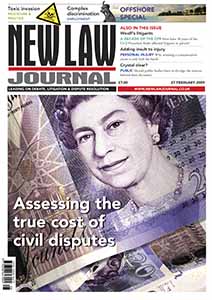THIS ISSUE

Personal injury victims deserve a guarantee that their compensation needs will be met, says Richard Scorer
Slingsby v Griffith Smith Solicitors [2009] All ER (D) 150 (Feb)
Ethics on the phone, Miners’ solicitors suspended, In-house advocacy
Ugiagbe v The London Borough of Southwark [2009] EWCA Civ 31, [2009] All ER (D) 95 (Feb)
Finance
Experimentation is vital in the review of civil justice costs, says Adrian Jack
Should public bodies make known the reasons behind their decisions? Asks Neil Parpworth
Family
MOVERS & SHAKERS

Carey Olsen—Kim Paiva
Group partner joins Guernsey banking and finance practice
.tmb-mov69x69.jpg?sfvrsn=16d9dd3d_1)
Morgan Lewis—Kat Gibson
London labour and employment team announces partner hire

Foot Anstey McKees—Chris Milligan & Michael Kelly
Double partner appointment marks Belfast expansion
NEWS
Is a suspect’s state of mind a ‘fact’ capable of triggering adverse inferences? Writing in NLJ this week, Andrew Smith of Corker Binning examines how R v Leslie reshapes the debate
The Ministry of Justice (MoJ) has not done enough to protect the future sustainability of the legal aid market, MPs have warned
Writing in NLJ this week, NLJ columnist Dominic Regan surveys a landscape marked by leapfrog appeals, costs skirmishes and notable retirements. With an appeal in Mazur due to be heard next month, Regan notes that uncertainties remain over who will intervene, and hopes for the involvement of the Lady Chief Justice and the Master of the Rolls in deciding the all-important outcome
After the Southport murders and the misinformation that followed, contempt of court law has come under intense scrutiny. In this week's NLJ, Lawrence McNamara and Lauren Schaefer of the Law Commission unpack proposals aimed at restoring clarity without sacrificing fair trial rights
The latest Home Office figures confirm that stop and search remains both controversial and diminished. Writing in NLJ this week, Neil Parpworth of De Montfort University analyses data showing historically low use of s 1 PACE powers, with drugs searches dominating what remains







